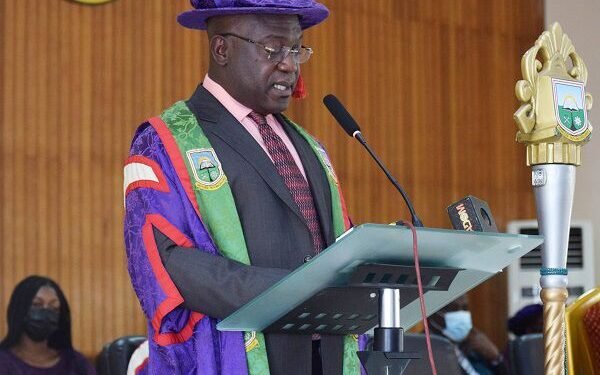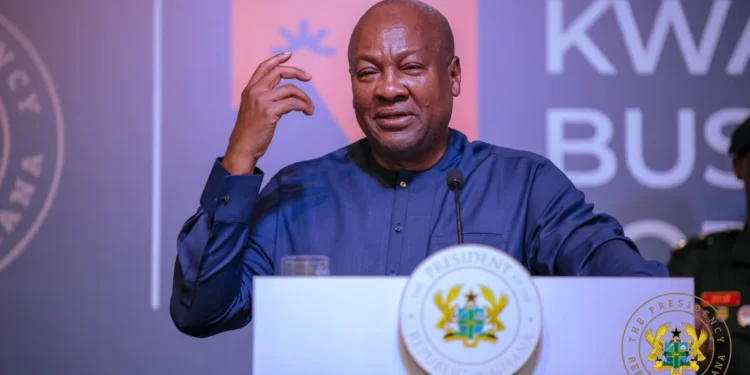The oil and gas sector in Ghana, long considered a cornerstone of the country’s economy, is plagued by persistent revenue leakages, weak institutional controls, and outdated infrastructure.
According to Joshua Batsa Narh, Executive Chairman of the Energy Chamber Ghana and Director at Wingfield Group, addressing these issues require a multi-pronged strategy focused on governance reforms, technological integration, and enhanced stakeholder collaboration.
Speaking in an interview with Vaultz News, Mr. Narh laid out a detailed roadmap for optimizing the sector’s potential while restoring public trust and bolstering economic contributions.
“Revenue leakages often stem from underreporting, mismanagement, and illicit financial flows.
“Strengthening fiscal frameworks can mitigate these issues.”
Joshua Batsa Narh, Executive Chairman of the Energy Chamber
Regular, transparent audits by independent oversight bodies should be mandated, with results publicly disclosed. He cited Norway’s Government Pension Fund Global as a model for institutionalized oversight and accountability.
“Implement a competitive and transparent process for awarding oil and gas licenses.
“Enforce stricter compliance with the Petroleum Revenue Management Act (PRMA) to ensure oil revenues are allocated as per the law. Introduce penalties for unauthorized expenditures.”
Joshua Batsa Narh, Executive Chairman of the Energy Chamber
Mr. Narh emphasized the transformative potential of technology in revenue tracking. “Utilizing blockchain for real-time tracking of production volumes and revenue flows ensures data transparency and reduces opportunities for discrepancies,” he added.
Mr. Narh advocated for the installation of state-of-the-art metering systems at production sites to monitor real-time output and prevent underreporting. He pointed to Nigeria’s Egina FPSO project as an example of best practices in metering.
Mr. Narh also recommended, developing a seamless platform linking the Ghana Revenue Authority (GRA), Ghana National Petroleum Corporation (GNPC), and the Ministry of Finance to track and reconcile revenues effectively.
To foster transparency and accountability, he noted that regulatory institutions like the Petroleum Commission must operate independently and be well-resourced.
“Limit political interference in the Commission’s activities and ensure it has adequate resources to enforce regulations effectively.
“Train regulatory staff in best practices for revenue management and financial auditing.”
Joshua Batsa Narh, Executive Chairman of the Energy Chamber
Mr. Narh cited examples from countries with exemplary oil and gas management systems. He recommended Ghana can learn from Norway, where oil revenues are transparently managed through the Government Pension Fund Global.
“All financial flows are publicly disclosed, and withdrawals are strictly regulated,” Mr. Narh disclosed.
“Recent reforms under the Nigerian Extractive Industries Transparency Initiative (NEITI) provide a model for tracking revenues and increasing accountability.
“The State Oil Fund of Azerbaijan ensures that all oil revenues are publicly accounted for, with expenditures tied to clear national priorities.”
Joshua Batsa Narh, Executive Chairman of the Energy Chamber
Revitalizing Ghana’s Downstream Petroleum Sector

Narh also addressed the challenges facing Ghana’s downstream petroleum sector, particularly the Tema Oil Refinery (TOR).
Despite Ghana’s potential as a refining hub in West Africa, TOR’s underutilization, aging infrastructure, and operational inefficiencies have limited its capacity to meet domestic and regional fuel demands.
Narh proposed targeted investments and strategic partnerships to revitalize the sector. Immediate upgrades to aging infrastructure, including replacing obsolete equipment, are necessary to improve operational efficiency and minimize downtime.
“Expanding refining capacity from the current 45,000 barrels per day (bpd) to match regional demand is vital.
“Nigeria’s $1.5 billion rehabilitation of its Port Harcourt refinery offers a viable benchmark.”
Joshua Batsa Narh, Executive Chairman of the Energy Chamber
Modernizing Tema’s port infrastructure to handle larger shipments and reduce turnaround times was highlighted as a priority.
Additionally, Mr. Narh proposed developing a regional pipeline network to facilitate trade in refined products with neighboring countries like Côte d’Ivoire and Togo.
TOR’s legacy debts remain a significant obstacle to attracting investments. To address this, Mr. Narh suggested, “Establishing SPVs to manage and restructure TOR’s debts.”
“Appoint experienced professionals to TOR’s leadership, following models like Saudi Aramco, where clear accountability and professional management drive efficiency.
“Conduct regular financial and operational audits to enhance investor confidence.”
Joshua Batsa Narh, Executive Chairman of the Energy Chamber
Ghana’s oil and gas sector holds immense potential, but systemic inefficiencies, revenue leakages, and infrastructure challenges threaten to undermine its contributions to the national economy.
Joshua Batsa Narh’s recommendations, rooted in governance reforms, technological integration, and strategic investments, offer a comprehensive roadmap for revitalizing the sector.
By addressing these challenges head-on, Ghana can unlock the full potential of its petroleum resources, bolster public trust, and position itself as a refining hub in West Africa.
READ ALSO: CDD-Ghana Fellow Urges Parliamentary Reforms in Ministerial Vetting Process























